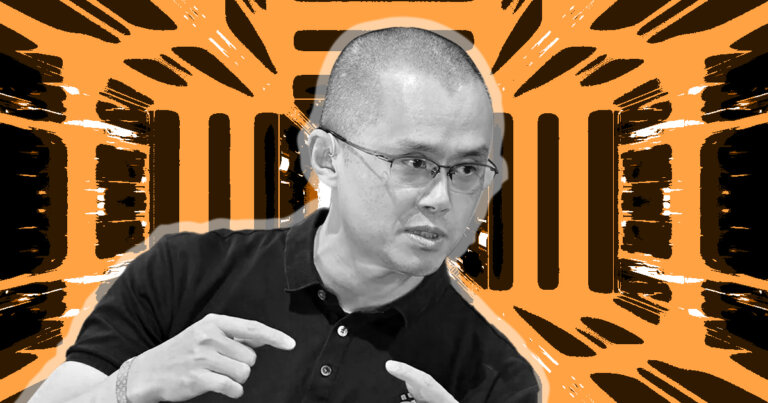 CZ addresses rumors about Circle telling regulators to look into Paxos/BUSD
CZ addresses rumors about Circle telling regulators to look into Paxos/BUSD CZ addresses rumors about Circle telling regulators to look into Paxos/BUSD
CZ believes there is no substance to reports that Jeremy Allaire, founder of Circle, secretly told New York regulators to look into Paxos and BUSD.

Web Summit / CC BY 2.0 / Flickr. Remixed by CryptoSlate
In a wide-ranging Twitter Spaces AMA on Feb. 14, the co-founder and CEO of Binance, Changpeng Zhao, addressed ongoing FUD around the BUSD stablecoin, rumors that Circle had snitched to New York regulators, and thoughts about shifting his attention from USD-backed stablecoins to alternatives like algorithmic, Euro and Yen-denominated ones.
PAXOS/BUSD FUD
Addressing some of the recent news surrounding Paxos’ halting of the minting of Binance stablecoin (BUSD), CZ said welcomed more stablecoin alternatives and that he ultimately supported more diffusion and competition in the marketplace.
He also said he believed there is no substance to recent reports that Jeremy Allaire, founder of Circle, secretly told New York regulators to look into Paxos and BUSD.
“We want to continue to work with industry players. I have spoken to Jeremy on multiple conference calls, I wouldn’t take that Bloomberg article too seriously.”
The need for stablecoins — even non-BUSD ones
He added that stablecoins themselves are not to blame but added that more transparency and communication with consumers would be key to avoiding another TerraUSD (UST).
“Stablecoins are still important because most people’s costs are still in fiat currency […] the industry probably will move away to non-US dollar based stablecoins and maybe also back to algorithmic ones. I think for algorithmic stablecoins, how to manage reserves should be done in a very transparent way.”
CZ added that even in such scenarios, “even if there is a peg loss, there may be an economic opportunity there for people to lose more money to maintain the peg. So I think the economics just need to be done in a way that makes more sense.”
Stressing however that more thought was needed into the topic, he said that the industry must nevertheless come together to find collective solutions, “it’s a large topic, but I think the industry collectively are looking for solutions that address the current difficulties we face.”
How much $15B in BUSD affect Binance’s bottom line
“To be honest, BUSD was never a big business for us when we started,” he said. “I actually thought the BUSD project may fail, so we actually don’t have very good economics on that collaboration. Now there’s going to be more stablecoins elsewhere, so we just want to sport as many of them as possible.”
The overall feeling in the industry, according to CZ, is that 2023 will bring more regulatory scrutiny. “I do believe the first drafts of most critical regulations are going to be overly tight. So we’re going to go from no regulatory clarity to overly tight. And then probably the next draft will lose another bit, and we’ll probably calibrate along those areas.”
Dishonest media
Nevertheless, CZ also cautioned against falling prey to overzealous media hype.
“We also know that media love to pit against one another. USDC versus USDT, Circle versus Paxos, or this guy versus that guy. The media love to do that, they love to spin that narrative. But I think we’ve got to be very careful not to fall into that trap.”
Support of Bitcoin Ordinals
On the emergence of Bitcoin Ordinals, CZ said he was excited to see what developers could store and create on the blockchain, though admitted that he is not particularly an avid collector of art nor NFTs.
“I’m not an art collector. I don’t really listen to music, either. I don’t buy crypto either, I just hold BNB and BTC. So I’m not an active trader, I’m not an NFT collector. I do think the technology is good, NFTs, et cetera, and I do think that we’re just at the tip of the iceberg in terms of what NFTs could do,” he said.
Latest GOPAX news
On Binance’s recent acquisition of GOPAX, a South Korean exchange that needed assistance in the wake of the FTX collapse, CZ said that together they and Binance will actively developing more products and services to service the South Korean market, which has one of the world’s highest crypto penetration rates of between 20-30%. “We’re actually really looking forward to improving the product and launching more products in South Korea,” the Binance CEO said.
On decentralized versus centralized exchanges, CZ said that he believes there is a space for both to thrive in the ecosystem. “I think that so far today for NFTs, the decentralized marketplaces are bigger than the centralized ones, so that’s also good,” CZ said. “It’s really for the user to decide, it’s not for me to guess or decide what we should finance as a platform. We should try to develop both, and we should try to invest in both,” CZ said.
For crypto entrepreneurs
Zhao concluded the AMA by saying that as regulators continue to crack down on crypto, it may be advisable for crypto-inclined entrepreneurs to friendlier jurisdictions.
“If you’re serious about your project, moving to a new country might not be a bad thing city, but people sometimes get scared about moving to a new country. I don’t know why that is.”
“There is definitely more crypto scrutiny and more attention paid to crypto. Different jurisdictions have different regulatory routines for blockchain web3 and crypto right now, Dubai is very positive, Bahrain is very good, France is pretty good too,” CZ said.





























































